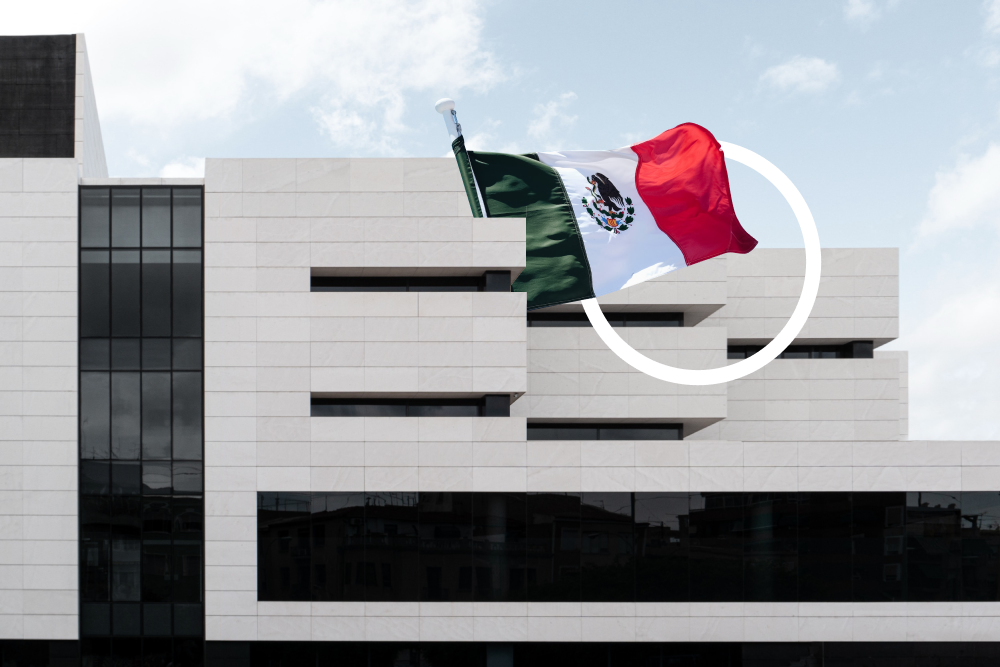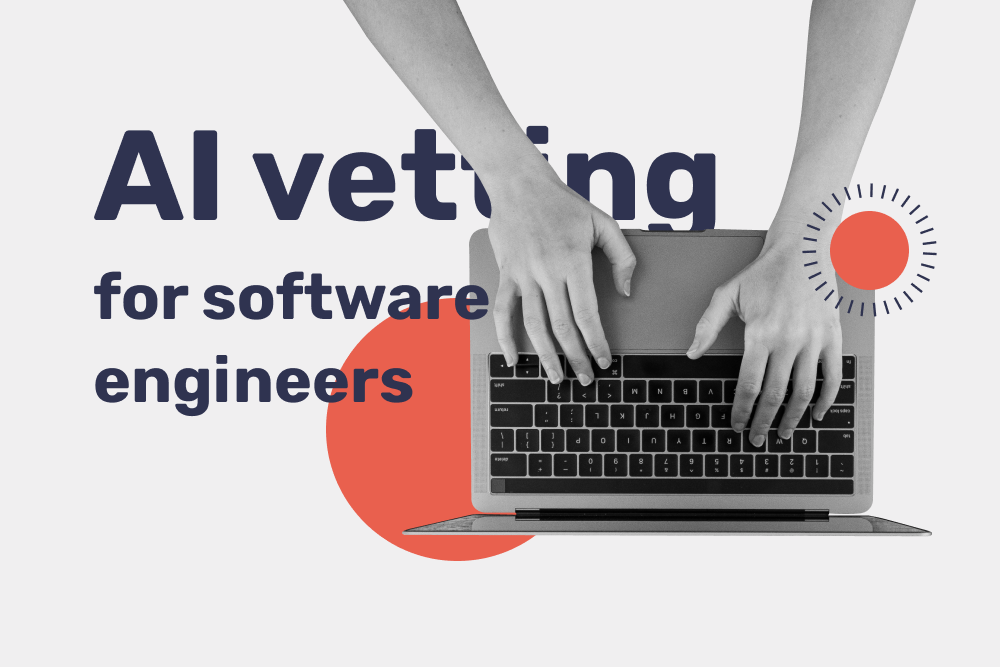Highly-qualified developers and competitive salary rates make Mexico a tempting spot for hiring engineering talent. Many companies, from young startups to tech giants like Google, Apple, Intel, and more, set up offices in Mexico to fill their tech talent gap.
US Tech Companies That Have R&D Offices in Mexico (Google, Apple, Intel and more!)
Still, companies looking to hire tech experts in Mexico should clearly understand and follow the country’s labor laws and regulations. With complex articles and provisions, Mexican Federal Labor Law might be challenging to navigate and interpret, especially for a foreign company. Being an experienced sourcing agency, we at Bridge have local Mexican recruiters who can help you deal with Mexican laws and hire technical experts with no legal hassle.
For you to stay compliant and avoid problems with local authorities, we’ve prepared a short guide covering key Mexican labor laws with some insights from our recruiter in Mexico. So, let’s jump right into it.
Brief overview of Mexican labor laws
Without overburdening you with too many details and nuances, let’s come through the basic aspects covered by the employment laws in Mexico.
- Minimum salary. Since 2023, the daily minimum wage in Mexico is 207.44 Mexican Pesos (around 12.11 US Dollars) for the country and 312.41 Mexican Pesos (around 18.24 US Dollars) for the Free Zone of the North Border. For comparison, the minimum federal wage in the USA is 7.25 US Dollars per hour. Of course, the rates differ from state to state in the USA and depend on various factors, but it’s still clear that it’s cheaper to hire developers in Mexico compared to America.
- Working week and overtime. According to Mexican Labor Law, for every six days of work, employees should have at least one day of rest with full pay, which is Sunday. In Mexico, there are three types of shifts: a day shift (between 6 a.m. and 8 p.m.), a night shift (between 8 p.m. and 6 a.m.), and a mixed shift (includes periods from day and night shifts). An employee can work not more than eight hours during the day, and seven hours at night. The working day may be extended, but not exceeding three hours per day or nine hours in a week. The hours of overtime are paid 100% more than a regular working hour. When overtime exceeds nine hours a week, it should be paid 200% more than a regular working hour.
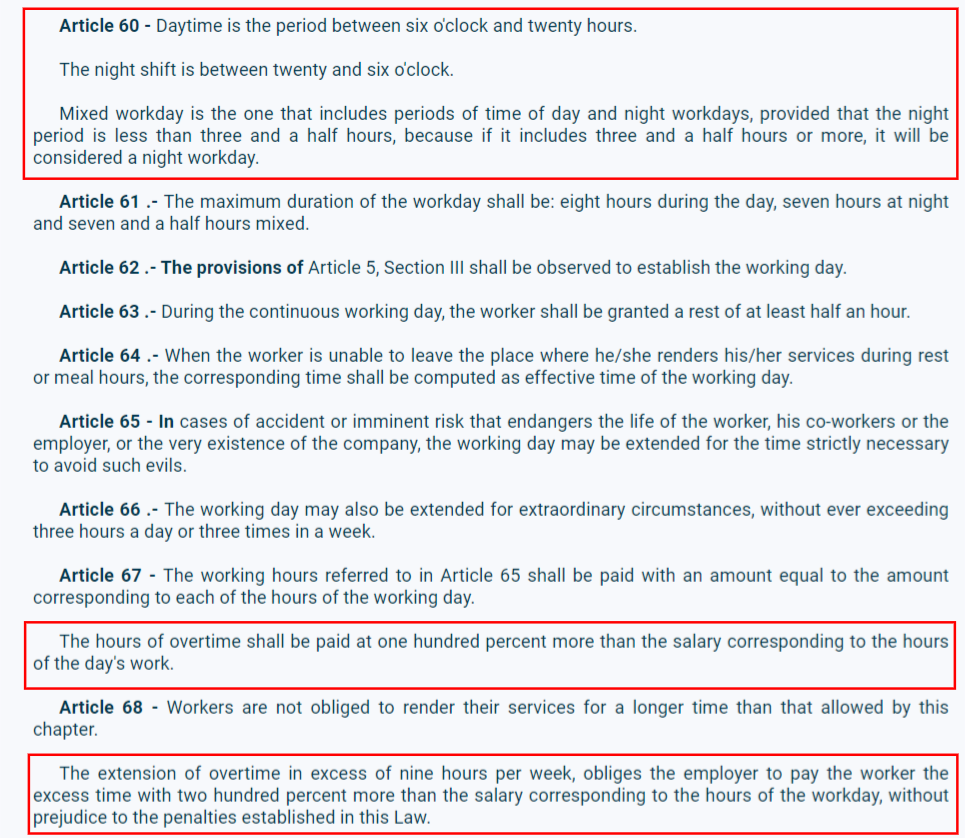
- Leaves. An employee working with an employer for at least one year is entitled to have an annual paid vacation, which is not less than twelve working days. Each subsequent year, it shall increase by two working days until it reaches twenty.

Working mothers shall have a break of twelve weeks ‒ six weeks before and six weeks after childbirth. Fathers, in turn, are granted five days of paid paternity leave.
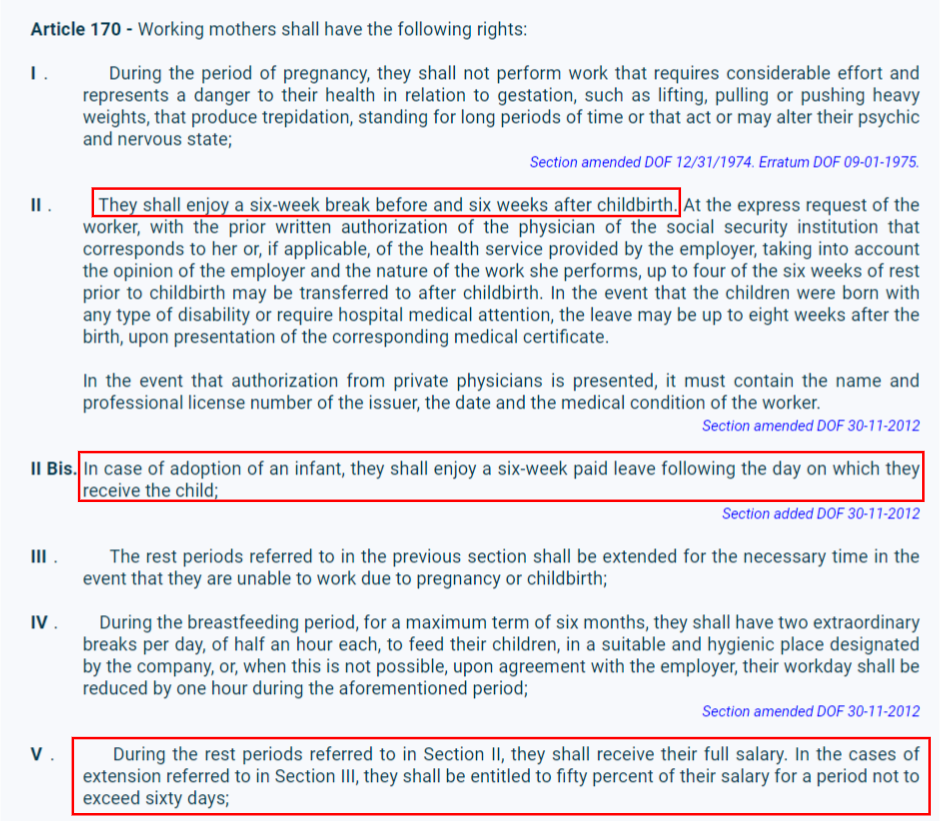
But here we have to say that apart from the laws, which are more or less clear, Mexico has complex and tricky regulations that are difficult to understand without expert knowledge and experience. For example, employers in Mexico can fire employees bearing no liability only for a limited number of reasons, including assaulting co-workers, attending work in an inadequate state, endangering workplace safety, and more.
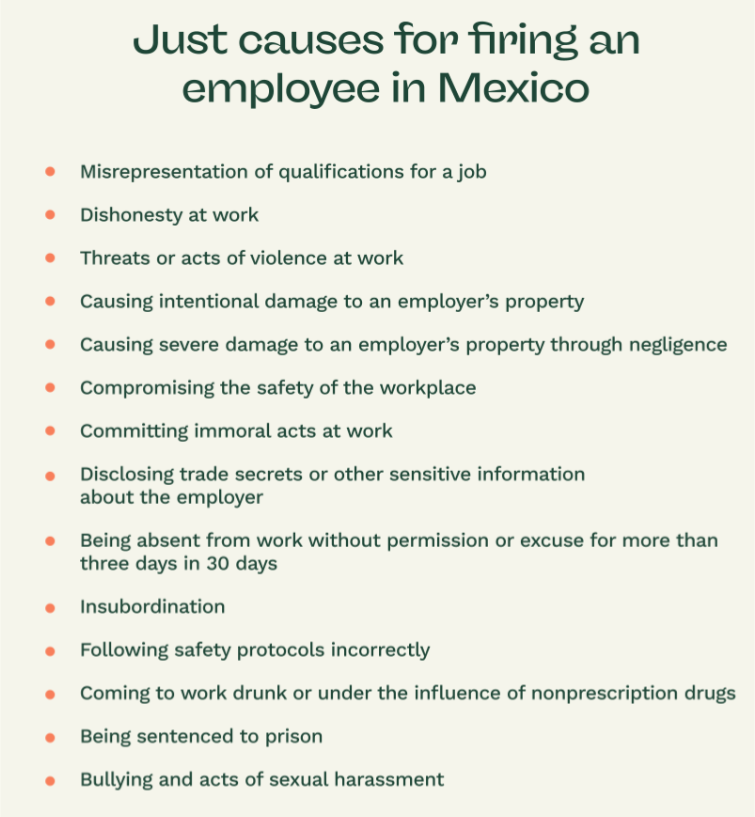
Besides, all company employees shall receive a Christmas bonus which should be paid no later than December 20, and be equal to a fifteen-day salary.

One more benefit that deserves our attention is profit sharing. In Mexico, employers are obliged to share a portion of their yearly profit with employees. The percentage that shall be distributed among employees (who have worked for at least sixty days in a company) is established by the National Commission for the Participation of Workers in the Profits of Companies and is currently equal to 10%.
Designed to govern and regulate relations between employers and employees, Mexican Labor Law has a bulk of intricacies that might pose challenges for foreign companies when there are no Mexican experts in place. But we have them at Bridge. Apart from Mexico, we can help you find tech engineers in other Latam countries, including Argentina, Colombia, Chile, and Brazil while staying compliant.
But apart from legal issues, you might face some other challenges when hiring remote developers. Let’s look at some of them.
Challenges when hiring tech talent in Mexico
Hiring top candidates is always tough in any country, including Mexico. Unfortunately, understanding labor laws and regulations is not the only challenge you have to deal with. Here are the obstacles you should overcome to find skilled developers in Mexico.
- High competition. The possibility to hire highly-qualified developers at a reasonable rate attracts companies of various sizes to Mexico, which increases the competition in the tech talent market. Therefore, to attract an expert developer, you should have an ace up your sleeve, like benefits and bonuses, clearly understand what the developers look for in a new position, and offer it to them.
How to Attract Tech Talent: What Matters Most to Software Developers?
- Rising salary expectations. The growing demand for tech talent gives rise to increasing salary expectations among developers. So, to attract top talent, you need to offer competitive salaries which might impact your project budget.
- Hidden costs. When you hire remote engineers in Mexico, make sure you keep in mind all related expenses, like taxes, benefits, and more. Otherwise, you can end up in a situation where your recruitment budget is significantly higher than you expected.
With Bridge, however, your costs are 100% transparent. When choosing our sourcing-as-a-service, you pay a fixed monthly fee and get a list of up to 30 pre-screened candidates per month. In case of IT staffing, you pay a daily or monthly rate for the developer’s work, while we cover costs of recruitment, training, office space, software licenses, employee benefits, payroll increments, and logistical expenses.
- Visa and immigration process. Just like with labor laws, you should keep compliant with immigration legislation to avoid fines and penalties if you plan to relocate specialists from Mexico. Ensuring compliance with legal requirements and assisting with work permits and visa applications can be time-consuming and require specialized expertise.
When you’d like to get more insights about tech hiring in Mexico, feel free to read an interview with our recruiter from Mexico.
How to comply with Mexican labor legislation
To avoid legal violations and ensure the hiring process is smooth, you can go two ways ‒ study the Mexican labor law in detail and strictly follow it, or partner with local experts who can do the job for you. Here is what to expect when choosing either way.
- Deal with labor laws on your own. Make sure you understand articles in the labor law (or at least those you need for your specific hiring case) and can correctly interpret them. Besides, you should keep your finger on the pulse of the latest law updates so that you don’t miss any changes. It will help you create a relevant employment contract that complies with legal requirements and outlines the terms and conditions of employment.
- Work with local recruiters. When cooperating with recruitment managers experienced in Mexican labor law, you may be sure the hiring process and employment contracts align with local laws and regulations.
At Bridge, we have local recruiters who can help you find engineers across three continents ‒ Latin America, North America, and Europe. They understand the technology and candidates’ cultural background which makes the outreach more efficient. Our sourcers become an extension to your in-house team to accelerate the sourcing process and let you create a list of valid candidates fast.
But no matter if you decide to work independently or partner with Bridge, it’s always useful to hear the opinion from the inside. Here are some insights from our recruiter in Mexico.
Expert insights to hire technical engineers in Mexico
Although Mexican employment laws seem clear on paper, it might still be unclear how they work in real life. Let’s address this question to Javier ‒ our local recruiter with years of experience. Here are the questions we discussed.
What is the typical process for hiring tech talent in Mexico, and how long does it usually take?
“Each client has its own process and time. Three to four weeks could be the ideal, it also depends on the difficulty of the role. We should consider the notice period (15 days usually). Here is how it typically looks:
- Requisition intake
- Sourcing
- General interview
- Tech interviews
- Test code (it’s optional, sometimes the client applies a live coding session or evaluates only with the technical interviews)”
Tell about the basics of Mexico’s labor laws, and how they might impact the hiring process.
“If your company does not have a legal entity in Mexico to hire directly, you can consider two options:
- Hire developers through a specialized services company. Although outsourcing was prohibited in 2021, the number of specialized services allows Mexican companies to continue providing this service with certain regulations. You can ask us about secure consultancies specialized in providing this service to foreign companies.
- Using a contractor schema is a common option. You can make direct salary transfers. It is necessary for the candidate to consider when agreeing on the salary that they must pay taxes for the amounts received in their bank account. They need to go to the SAT offices (Tax Administration System) and register in one of the schemes offered for independent professionals”.
What are some of the biggest challenges US companies face when hiring tech talent in Mexico, and how can local recruiters help them overcome those challenges?
“Mainly communication problems due to not being familiar with the legal terms in Mexico. There may be doubts on both sides about the hiring options.
We help by explaining what the hiring options consist of, how a contractor scheme works, or connecting them with a company that provides specialized services in México and that can take care of payroll and legal issues.”
Share some examples of successful hires our team made for other US-based (or not only) tech companies in Mexico, and what made those hires successful.
“We recently closed two positions for a US-based game company. One in México and the other one in Chile with similar conditions. We participated during the entire process (from the sourcing to the offer acceptance). It’s normal that the candidates have a lot of questions about the offer, payments, and scheme. We communicated the hiring options, their pros and cons, explained the taxes part and helped to identify the best one for the candidates and the company.”
As you see, the Mexican Labor Law is quite complex and has its hidden pitfalls, so it will not hurt to have an expert on board, who can explain how the law works in reality.
Hire skilled engineers in Mexico with Bridge
When legal compliance stops you from hiring developers in Mexico, Bridge will help you overcome it. Our experienced sourcing team can find top experts for your project while staying compliant and avoiding penalties and fines.
Contact us to assign a Mexican recruiter for your project and start sourcing right now!
